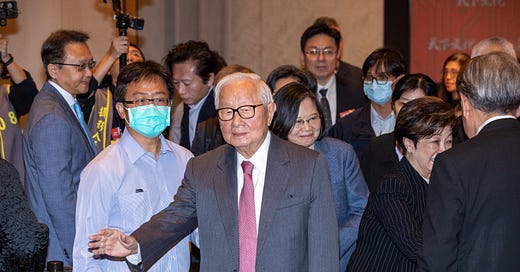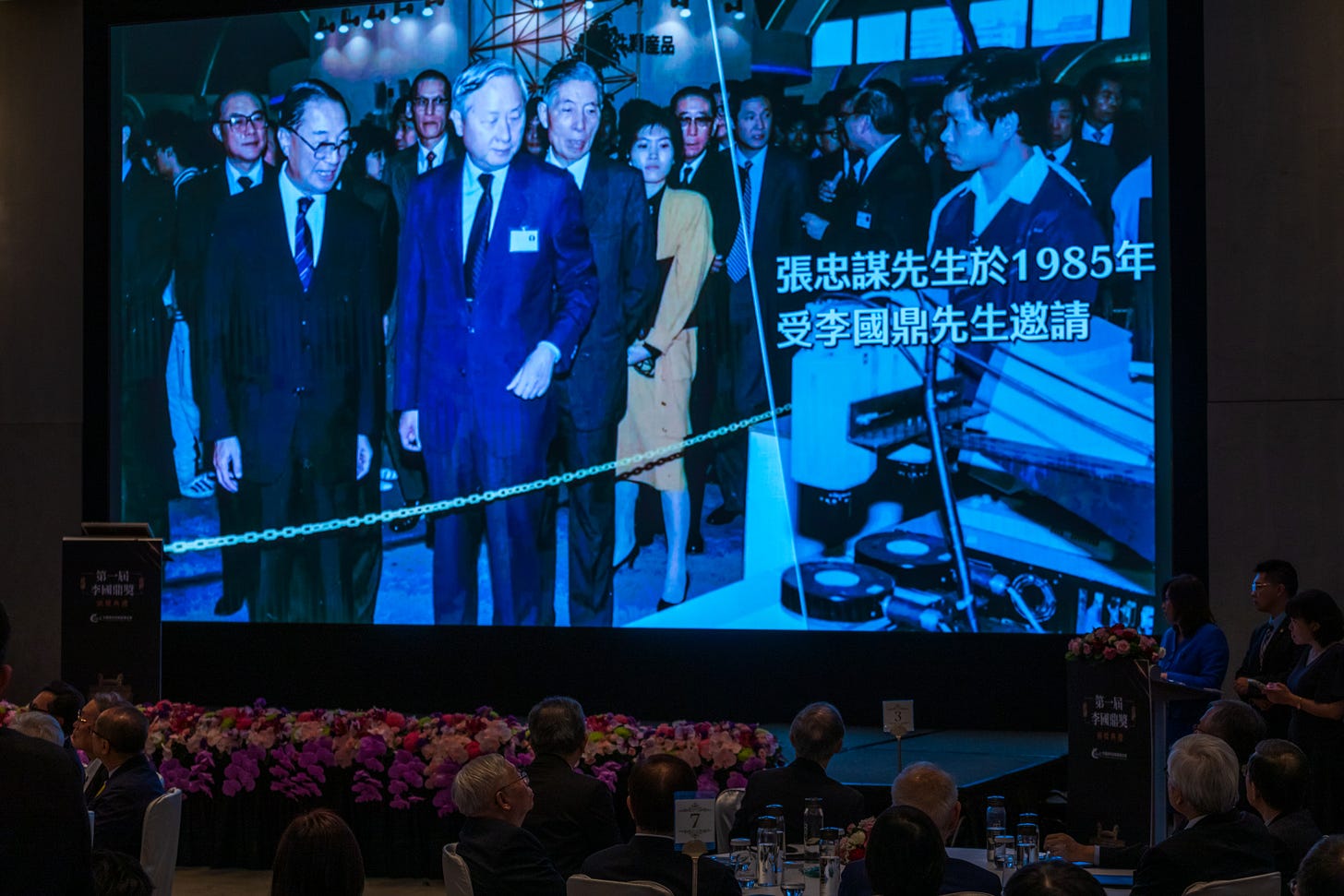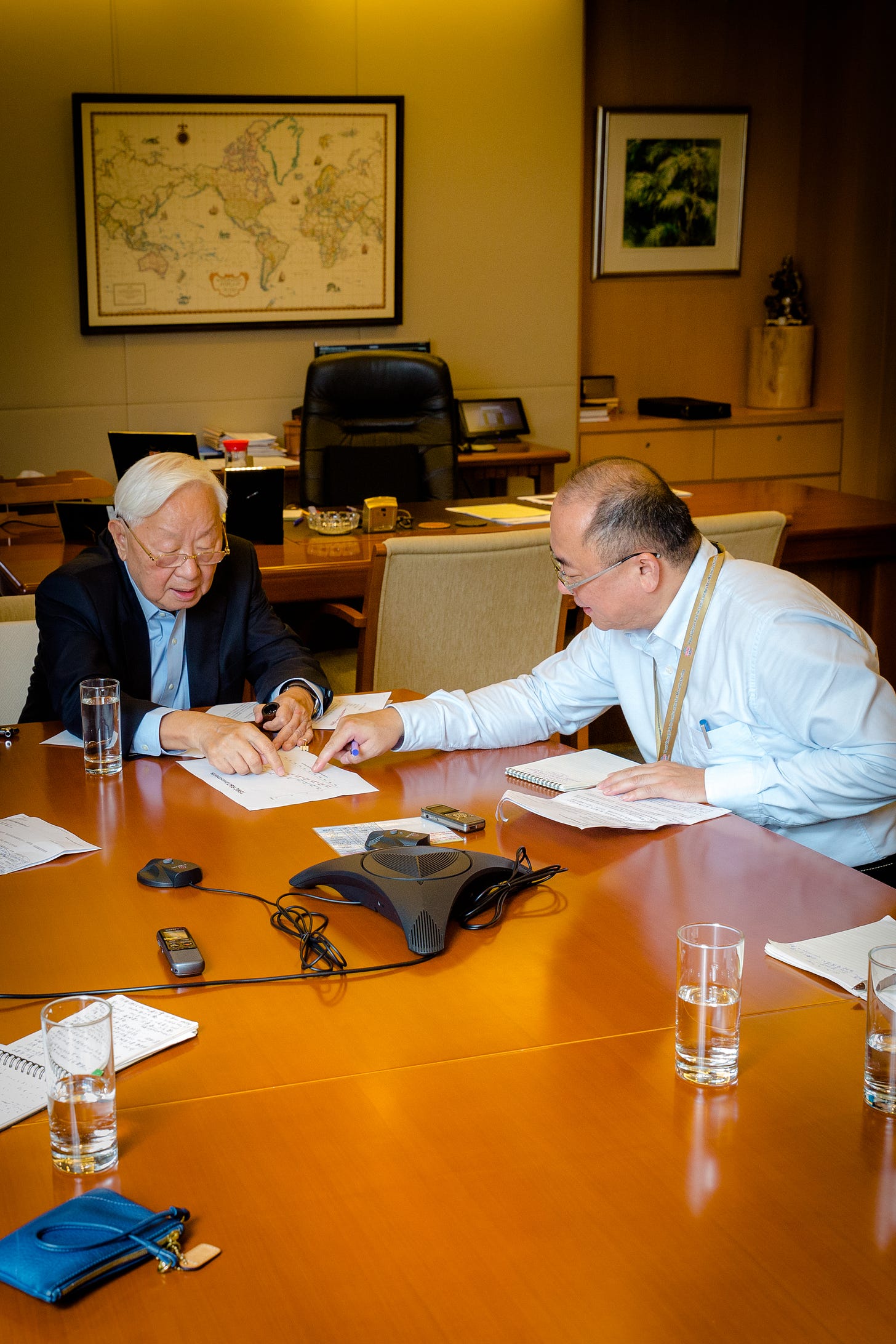Anonymous Complaints and Hidden Agendas: How adversity and coincidence led to creation of TSMC?
Liang-rong Chen
Morris Chang, founder of TSMC, launched his full autobiography on December 9th. (Source: Chien-Tong Wang)
If Morris Chang’s autobiography were adapted into a trilogy akin to *The Godfather* or *Star Wars*, the first installment should begin with his life at age 54. This is the highlight of the second volume of Morris Chang’s autobiography.
After his career setbacks in the US, Chang accepted an offer in August 1985 to become president of ITRI in Taiwan. Within days of arriving on this unfamiliar subtropical island, he was tasked by Minister Without Portfolio Kwoh-ting Li (K. T. Li) to establish a billion-dollar semiconductor foundry—what would later become TSMC.
The first installment could culminate two years later, when Intel’s legendary former CEO Andy Grove visited TSMC. Impressed by the outstanding production quality, Grove placed an order with this small Asian company, changing its destiny and ushering in what Chang refers to as the "roaring 1990s."
Two Years of Adversity
These two short yet dramatic years were filled with setbacks, grueling efforts, conspiracies, and unexpected turns. They occupy nearly 100 pages of Chang’s autobiography, detailing a pivotal era that laid the foundation for TSMC's unprecedented rise.
As the former General Manager of Texas Instruments’ Global Semiconductor Business Group, Morris Chang was among the most elite professional managers in the United States. His annual salary exceeded $200,000—more than 20 times that of a cabinet minister in Taiwan during the 1980s.
You would think that when someone of his stature was brought to Taiwan, the government would have rolled out the red carpet, tailoring everything to accommodate his expertise. But the reality was far from it.
In the second volume of his autobiography, Chang reveals that his three years at ITRI felt more like walking on eggshells, as he cautiously navigated the environment, enduring numerous grievances.
From the moment he assumed the role of ITRI President, he encountered the challenges often faced by “outsider” leaders in public institutions—an avalanche of anonymous complaint letters targeting him.
When President Ching-kuo Chiang passed away and Teng-hui Lee assumed the presidency, Chang had the chance to meet Lee during an ITRI visit. However, a single ill-timed response led to an awkward exchange. “My anxious expression was met with his dismissive glare,” Chang recounted in his book.
Coupled with many obstacles to implementing reforms, Chang experienced “a profound sense of frustration,” and he lamented how “the bold confidence I had in my 40s, leading the global semiconductor industry, had completely evaporated.”
A Scene-Stealing Antagonist Steps into the Spotlight
This book introduces a figure rarely mentioned in the story of TSMC’s founding—a behind-the-scenes puppet master: Li-an Chen, who served as Chairman of the National Science Council and later as Minister of Economic Affairs.
Chen frequently obstructed Morris Chang’s efforts. He initially opposed Chang’s appointment as President of ITRI, questioning, “Taiwan has plenty of talent—why recruit someone from abroad?”
If this story were adapted into a movie, Li-an Chen would undoubtedly be a scene-stealing antagonist. Dashing and charismatic, he was one of the Kuomintang’s famous “Four Princes.” His father, Cheng Chen, had once held immense power, serving as Vice President and Premier for years. As a child, Li-an Chen frequently visited the Chiang family residence, even playing chess with Chiang Kai-shek.
Chen’s impressive academic background only added to his prestige. He held a Ph.D. in Mathematics from New York University and studied Electrical Engineering at MIT as an undergraduate. He was even exempted from military service to study abroad, thanks to a short-lived government policy enacted by the Ministry of Education the year he graduated high school—a policy nicknamed the “Chen Li-an Clause.”
Morris Chang found himself up against this Taiwanese version of a “princeling.” A senior TSMC executive once confided in me, “I didn’t realize the early days of TSMC were so fraught with undercurrents—it was nearly doomed from the start.”
Li-an Chen not only opposed government investment in TSMC but also proposed hiring foreign consultants to evaluate the feasibility of a dedicated semiconductor foundry. This impasse continued until Morris Chang sought help from K. T. Li, a senior statesman in his seventies. Outraged by the resistance, Li threatened to resign in protest, forcing Chen to back down.
But the challenges didn’t end there. In his third year as ITRI President, Morris Chang faced another blow: Li-an Chen was appointed Minister of Economic Affairs, becoming his direct superior.
This was the final straw for Chang. He resigned as ITRI President, transitioning to a non-salaried, largely symbolic role as Chairman of the ITRI Board.
Looking back, however, what seemed like a setback was a blessing in disguise. Free from the quagmire of ITRI’s reform efforts, Chang was able to dedicate himself fully to building TSMC.
Morris Chang is the recipient of the first K. T. Li Award in 2023. (source: Chien-Ying Chiu)
The Reluctant Path to Semiconductor Success
After reading the second volume of Morris Chang’s autobiography, a veteran in the semiconductor industry couldn’t help but remark, “Morris Chang is truly lucky—every step of the way, he was forced into decisions, but they always turned out for the best.”
Take, for example, the well-known story of Chang’s recruitment to Taiwan. It’s often oversimplified as the government’s desire to develop the semiconductor industry, leading them to bring in the most senior Chinese professional from the U.S. semiconductor sector—and the rest is history.
But the reality was far more complicated.
Chang sets the record straight in his book. It wasn’t K. T. Li who brought him to Taiwan, but Hsien-hsiu Hsu, the Chairman of ITRI at the time. Hsu’s intention was straightforward: he needed someone to lead a national research institute. Semiconductors were never even mentioned during the recruitment process.
It wasn’t until Chang arrived in Taiwan that he discovered there was another mission waiting for him.
Three Startups’ “Outrageous Demands” Spark the Birth of TSMC
It all began with three ambitious Chinese-led teams breaking away from two of Silicon Valley’s semiconductor giants, Fairchild and Intel. They established three memory companies—Quasel, Mosel, and Vitelic—and soon turned their eyes to Taiwan. While their investments attracted attention, they made a bold and seemingly outrageous demand: the government should fund a wafer fab for each of them.
For Morris Chang, who had led the world’s largest semiconductor business, such demands from startups seemed laughable. Rejecting them outright felt like the obvious choice.
Yet, to his surprise, his peers and subordinates thought the demands deserved serious consideration. Even K. T. Li, his superior, urged him to explore solutions. Chang couldn’t help but wonder—was there more to this than met the eye?
A veteran in the semiconductor industry later confided in me, “There was some truth to those suspicions, though not entirely.”
The hidden story, as it turns out, unfolded in two parts.
First, among the three startups, Quasel stood out as the most influential, and not without reason—it had significant backing. Its founder, Teh-kai Koo, was a prominent Kuomintang insider, while its factory director, Wei-jen Lo, was the son of General Yang-bian Lo, a former commander of the Military Police Command. With such connections, Quasel secured its first round of funding primarily from government sources, including the Bank of Communications, the Executive Yuan Development Fund, and China Development Corporation.
The second layer of intrigue predated Morris Chang’s arrival in Taiwan by a year, in 1984. A senior executive from UMC’s early days shared that the government had already considered creating a “shared fab” to support domestic IC startups, driven by the demands of these three companies founded by returnee scholars.
At the time, UMC had just spun off from ITRI and operated as an IDM (Integrated Device Manufacturer). Economic Affairs Minister Li-teh Hsu had approved UMC General Manager Robert Tsao’s proposal to invest NT$10 billion in a dedicated semiconductor manufacturing company. However, Hsu’s resignation in early 1985 due to the case of 10th Credit Cooperative of Taipei (十信案) put the plan on hold.
In the interim, two of the three startups had already moved production to Japan and South Korea. Under mounting pressure from public opinion and legislators, the government decided to revisit the “NT$10 billion wafer fab investment” plan.
It was at this pivotal moment that Morris Chang, almost by chance, arrived in Taiwan—and became the greatest beneficiary of the plan.
During Liang-rong Chen’s interview with Morris Chang in 2016 when he was chairman of TSMC. (Source: Chien-Ying Chiu)
A New Era of Wafer Foundries: Envy Turns to Respect
A former UMC executive once told me, “At first, we felt a bit envious.” But over time, they came to admire Morris Chang’s vision. His concept of a “dedicated wafer foundry” was far more ambitious than the original “shared fab” idea. “From the very beginning, he was determined to build a global business,” the executive remarked with a sense of awe.
Ironically, the three startups that caused such a stir in Taiwan and indirectly catalyzed the creation of TSMC never placed any orders with the company. In the end, all three were swept away by the tides of history.
Vitelic was eventually merged into Mosel, which later became part of Micron Taiwan. Just a month after Morris Chang decided to establish TSMC, Teh-kai Koo, the founder of Quasel, resigned as CEO due to heavy losses. Two years later, Quasel ceased operations entirely.
Meanwhile, Quasel’s factory director, Wei-jen Lo, returned to Intel before eventually joining TSMC. Over time, he became one of Morris Chang’s most trusted R&D leaders and now serves as TSMC’s Senior Vice President for Corporate Strategy Development.
Morris Chang once famously said, “Without K. T. Li, there would be no TSMC.” But as we look back, it’s clear that TSMC’s creation was shaped by a series of unlikely events: the rise and fall of the three startups, Li-an Chen’s term as Minister of Economic Affairs, and even the 10th Credit case. Without these elements, today’s TSMC might never have existed.
This modern industrial policy success story was, in many ways, the result of fortuitous timing and coincidences.
In other words, replicating TSMC’s success is nearly impossible. That, to me, is the most profound takeaway from second volume of Morris Chang’s autobiography.






